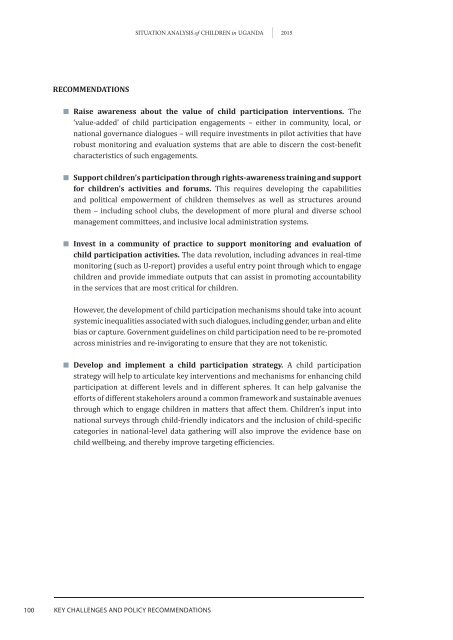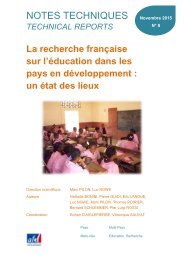- Page 1:
2015Situation analySiSof Children i
- Page 4 and 5:
4Situation analySiS of Children in
- Page 6 and 7:
Situation analySiS of Children in u
- Page 8 and 9:
Situation analySiS of Children in u
- Page 10 and 11:
Situation analySiS of Children in u
- Page 12 and 13:
Situation analySiS of Children in u
- Page 14 and 15:
Situation analySiS of Children in u
- Page 17 and 18:
Situation analySiS of Children in u
- Page 19 and 20:
Situation analySiS of Children in u
- Page 21 and 22:
Situation analySiS of Children in u
- Page 23 and 24:
Situation analySiS of Children in u
- Page 25 and 26:
Situation analySiS of Children in u
- Page 27 and 28:
Situation analySiS of Children in u
- Page 29 and 30:
Situation analySiS of Children in u
- Page 31 and 32:
Situation analySiS of Children in u
- Page 33 and 34:
Situation analySiS of Children in u
- Page 35 and 36:
Situation analySiS of Children in u
- Page 37 and 38:
Situation analySiS of Children in u
- Page 39 and 40:
Situation analySiS of Children in u
- Page 41 and 42:
Situation analySiS of Children in u
- Page 43 and 44:
Situation analySiS of Children in u
- Page 45:
Situation analySiS of Children in u
- Page 48 and 49:
Situation analySiS of Children in u
- Page 50 and 51:
Situation analySiS of Children in u
- Page 52 and 53:
Situation analySiS of Children in u
- Page 54 and 55:
Situation analySiS of Children in u
- Page 56 and 57:
Situation analySiS of Children in u
- Page 58 and 59:
Situation analySiS of Children in u
- Page 60 and 61:
Situation analySiS of Children in u
- Page 62 and 63:
Situation analySiS of Children in u
- Page 64 and 65:
48 thE rIGht to SUrvIvaLSituation a
- Page 66 and 67: Situation analySiS of Children in u
- Page 68 and 69: Situation analySiS of Children in u
- Page 70 and 71: Situation analySiS of Children in u
- Page 72 and 73: Situation analySiS of Children in u
- Page 74 and 75: Situation analySiS of Children in u
- Page 76 and 77: Situation analySiS of Children in u
- Page 78 and 79: Situation analySiS of Children in u
- Page 80 and 81: Situation analySiS of Children in u
- Page 82 and 83: Situation analySiS of Children in u
- Page 84 and 85: Situation analySiS of Children in u
- Page 86 and 87: Situation analySiS of Children in u
- Page 88 and 89: Situation analySiS of Children in u
- Page 90 and 91: Situation analySiS of Children in u
- Page 92 and 93: Situation analySiS of Children in u
- Page 94 and 95: Situation analySiS of Children in u
- Page 96 and 97: Situation analySiS of Children in u
- Page 98 and 99: Situation analySiS of Children in u
- Page 100 and 101: Situation analySiS of Children in u
- Page 102 and 103: Situation analySiS of Children in u
- Page 104 and 105: 88 KEy ChaLLENGES aND PoLICy rECoMM
- Page 106 and 107: Situation analySiS of Children in u
- Page 108 and 109: Situation analySiS of Children in u
- Page 110 and 111: Situation analySiS of Children in u
- Page 112 and 113: Situation analySiS of Children in u
- Page 114 and 115: Situation analySiS of Children in u
- Page 118 and 119: Situation analySiS of Children in u
- Page 120 and 121: Situation analySiS of Children in u
- Page 122 and 123: Situation analySiS of Children in u
- Page 124 and 125: Situation analySiS of Children in u
- Page 126 and 127: Situation analySiS of Children in u
- Page 128 and 129: Situation analySiS of Children in u
- Page 130 and 131: Situation analySiS of Children in u
- Page 132 and 133: Situation analySiS of Children in u
- Page 134 and 135: SITUATION ANAlySIS of ChIldreN in U
- Page 136 and 137: SITUATION ANAlySIS of ChIldreN in U
- Page 138 and 139: SITUATION ANAlySIS of ChIldreN in U
- Page 140 and 141: SITUATION ANAlySIS of ChIldreN in U
- Page 142 and 143: SITUATION ANAlySIS of ChIldreN in U
- Page 144 and 145: SITUATION ANAlySIS of ChIldreN in U
- Page 146 and 147: SITUATION ANAlySIS of ChIldreN in U
- Page 148 and 149: SITUATION ANAlySIS of ChIldreN in U
- Page 150 and 151: SITUATION ANAlySIS of ChIldreN in U
- Page 152 and 153: SITUATION ANAlySIS of ChIldreN in U
- Page 154 and 155: SITUATION ANAlySIS of ChIldreN in U
- Page 156 and 157: SITUATION ANAlySIS of ChIldreN in U
- Page 158 and 159: SITUATION ANAlySIS of ChIldreN in U
- Page 160 and 161: SITUATION ANAlySIS of ChIldreN in U
- Page 162 and 163: SITUATION ANAlySIS of ChIldreN in U
- Page 164 and 165: SITUATION ANAlySIS of ChIldreN in U
- Page 166 and 167:
SITUATION ANAlySIS of ChIldreN in U
- Page 168 and 169:
SITUATION ANAlySIS of ChIldreN in U
- Page 170 and 171:
SITUATION ANAlySIS of ChIldreN in U
- Page 172 and 173:
SITUATION ANAlySIS of ChIldreN in U
- Page 174 and 175:
SITUATION ANAlySIS of ChIldreN in U
- Page 176 and 177:
SITUATION ANAlySIS of ChIldreN in U
- Page 178 and 179:
SITUATION ANAlySIS of ChIldreN in U
- Page 180 and 181:
SITUATION ANAlySIS of ChIldreN in U
- Page 182 and 183:
SITUATION ANAlySIS of ChIldreN in U
- Page 184 and 185:
SITUATION ANAlySIS of ChIldreN in U
- Page 186 and 187:
SITUATION ANAlySIS of ChIldreN in U
- Page 188 and 189:
SITUATION ANAlySIS of ChIldreN in U
- Page 190 and 191:
SITUATION ANAlySIS of ChIldreN in U
- Page 192 and 193:
SITUATION ANAlySIS of ChIldreN in U
- Page 194 and 195:
SITUATION ANAlySIS of ChIldreN in U
- Page 196:
2015Situation analySiSof Children i




